‘A story of challenges’: Chief Cyrus Ben shares Choctaws’ history
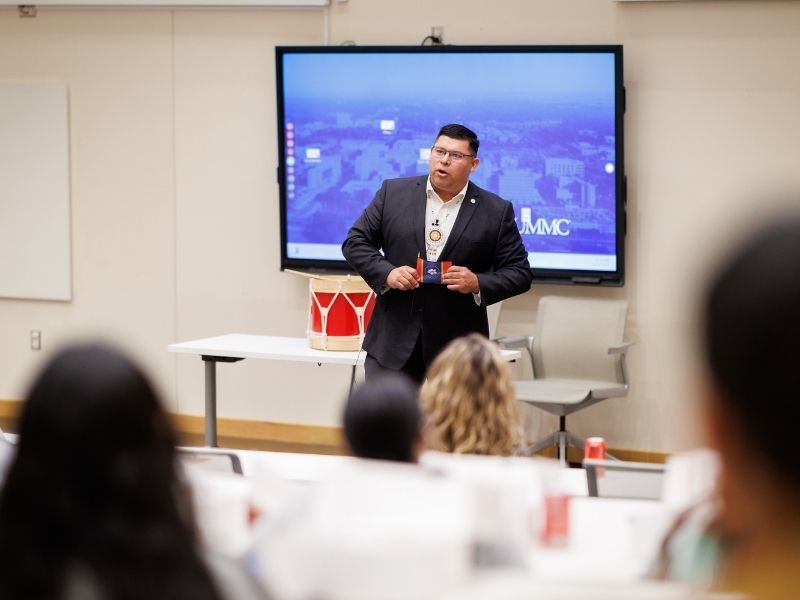
There was an anatomy lesson in the medical school last week, but the object of dissection was, and is, still full of life.
Chief Cyrus Ben, Tribal Chief of the Mississippi Band of Choctaw Indians, dissected the centuries-old Choctaw culture and history during a visit on Thursday from 28 Choctaw Central High School students researching health careers at the University of Mississippi Medical Center.
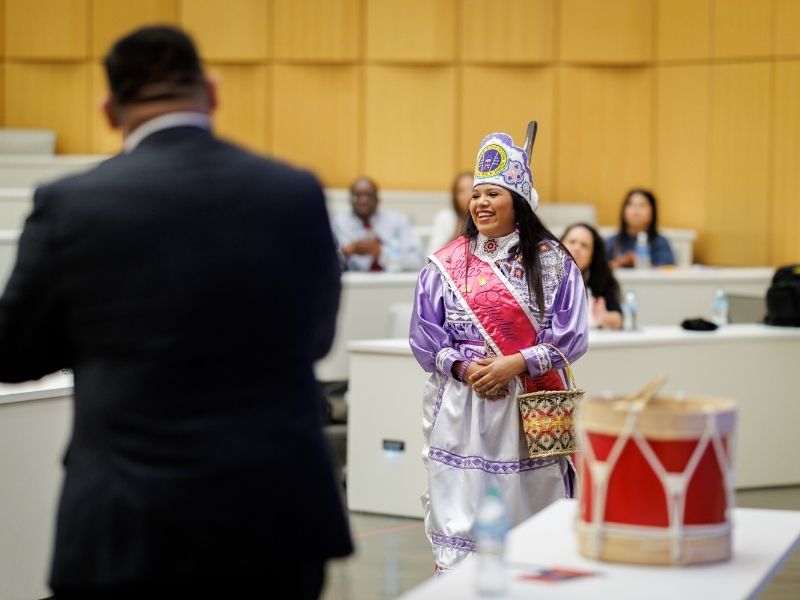
In a School of Medicine lecture hall, those students were joined by dozens of health professions students, faculty and other representatives of UMMC for Chief Ben’s analysis, a presentation by a groundbreaking medical school graduate, and a royal appearance – by 2024 Choctaw Indian Princess Leilani Elyse Allen.
The occasion was part of a celebration of a heritage that, as Chief Ben put it, the 11,000 members of the state’s only federally-recognized tribe “live each day.”
This Native American legacy includes a history of “not-so-kind treatment,” he said, by a U.S. government that, two centuries ago, tried to force Choctaws off their land.
“Each and every one of us has a history and story of challenges,” he said, “whether it’s family history or community history, cultural history …, so, I’m not here to demean any of the challenges that any other people faced. I just want to share with you because [traditional school] curriculum does not properly teach what happened to our people.”
Today, the Choctaw people in Mississippi live on or near more than 35,000 acres of tribal lands in the east-central part of the state, where they nurture their culture and traditions, including stickball, beadwork and the annual Choctaw Indian Fair.
Their current leader, re-elected to a second term, is a graduate of Mississippi College, which in 2022 presented him with the Order of the Golden Arrow Award, reserved for accomplished alumni.
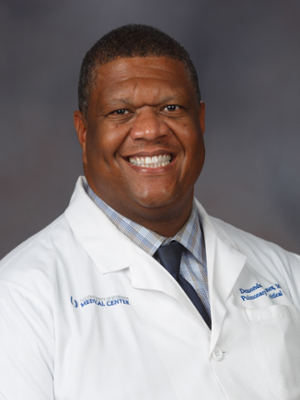
Dr. Demondes Haynes, UMMC professor of medicine and associate dean for medical school admissions, acted as host for the event – held to honor Native American Heritage Month and the Band of Choctaw Indians and “to expose more of their students to health care professions,” he said afterward.
“Also, by exposing our own students at the Medical Center to different cultures, we are more able to provide culturally competent care.
“There are a lot of health care disparities that affect Native Americans, including diabetes, which was discussed. When you look at underrepresented groups in medical careers, you see that they also have the largest health care gaps.”
The visiting students’ agenda included a tour of the Simulation Lab in the School of Medicine and presentations by the schools of dentistry and pharmacy; it ended with Chief Ben’s address.
“We at the Medical Center hope to continue improving our relationship with the Choctaw people,” Haynes said, “so, I was so glad that Chief Ben was able to come here.”
A fluent speaker of the Choctaw language, Chief Ben has served on national tribal advisory boards and in other high-profile leadership roles.
A resident of the Pearl River community with his wife, TaRita, and their three children, he was named by Gov. Tate Reeves to the Commission to Redesign the Mississippi State Flag, which selected a design for a new state standard. It includes a gold five-point star, a symbol of Native American lands that existed long before Mississippi became, in 1817, the 20th state.
“Our people have been here for centuries,” Chief Ben said. “We have been able to do things to progress to our future, our future that’s sitting right here in the middle of this room.
“We are grateful that we can continue on with the opportunities that have been given to us … that have allowed us to be a success today.”
Perhaps the Band of Choctaw’s best-known enterprise is the Pearl River Resort with its golf courses, water theme park, restaurants and casinos. But successes also include its education system, which oversees around 2,200 students on eight campuses; and community services such as a nutrition program, public safety and recreation.
“We are a state within a state,” said Chief Ben, who heads the executive branch of the Choctaw Indians Tribal Government.
Another mark of achievement is the 180,000-square-foot Choctaw Health Center, which offers three rural health clinics and collaborates with several UMMC physicians. At UMMC, Dianne Gilbert serves as Choctaw Liaison, offering language assistance, translations and more to patients from Choctaw communities, some of whom, especially elders, speak only their native language.
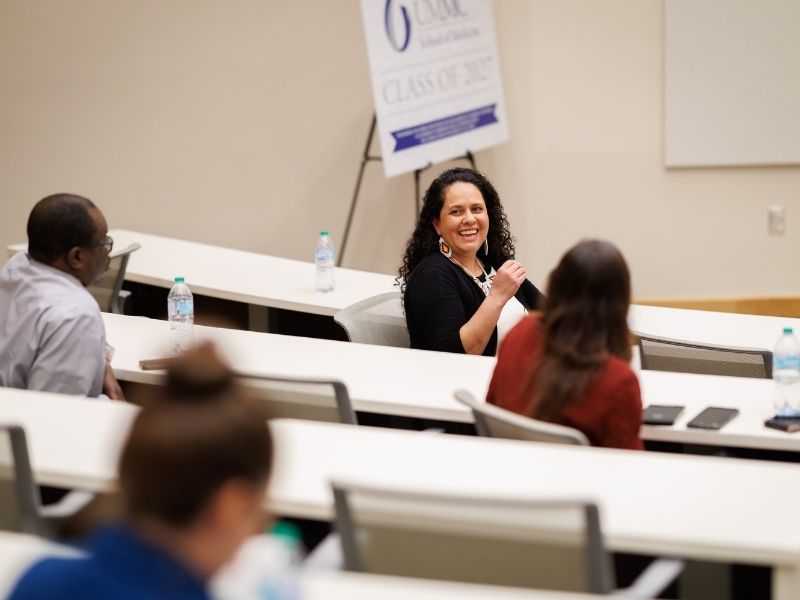
Among those who see patients at the Choctaw Health Center is Dr. Christina Wallace, a 2019 graduate of the UMMC School of Medicine and the first-ever tribal member to earn an MD.
Wallace, who completed her internal medicine residency at UMMC, spoke Thursday about her journey to medical school, inspired by the example of her mom, a single parent who worked as a registered nurse.
“I always had a passion for returning home,” Wallace said, “and a passion for working with the Native American community, to build good relationships and focus on disease prevention.”
After describing the services available at the Choctaw Health Center, Wallace turned recruiter. Fixing a meaningful gaze on the audience, she said: “I’ll put this out there as well: We always have openings.”
Coordinated by Dr. Dan Coleman, medical school outreach director, and funded by the School of Medicine’s Office of Admissions, the event wrapped up with a Q&A session, but not before Chief Ben literally beat the drum for the Band of Choctaws.
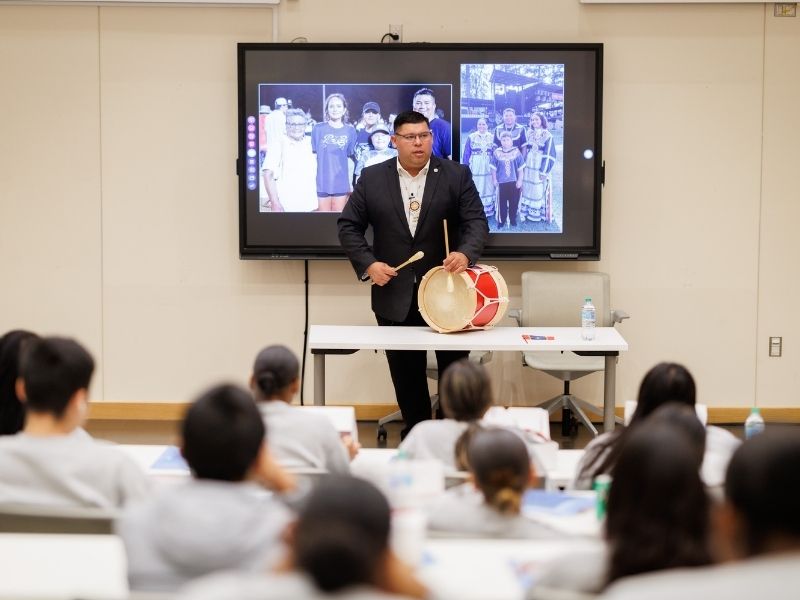
“We refer to it as the heartbeat of our people,” he said, striking a small drum with sticks, a sound that mimicked the pounding of a human heart.
The drum is the centerpiece of the Choctaw’s tribal seal and is struck during cultural activities and social events. It is the voice of ancestors, Chief Ben said, speaking down through the years of their people’s past and their survival to this day.
“The drum still signifies the strength of our people.”


